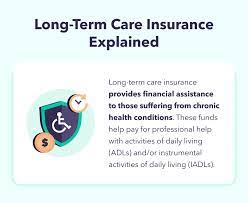Long-term care insurance (LTCI) is a type of insurance coverage that helps individuals cover the costs associated with long-term care services. These services are often needed when individuals are unable to perform certain activities of daily living (ADLs) due to illness, injury, or aging. Long-term care can be provided at home, in assisted living facilities, or in nursing homes.
In this article, we’ll explore the ins and outs of long-term care insurance to help you determine if it’s the right choice for you or your loved ones.

What Does Long-Term Care Insurance Cover?
Long-term care insurance typically covers the following types of care:
- Nursing Home Care: This includes care provided in a skilled nursing facility.
- Assisted Living Facility Care: This includes care provided in a facility that offers assistance with ADLs but does not require skilled nursing care.
- Home Health Care: This includes care provided at home by a licensed caregiver or nurse.
- Adult Day Care: This includes care provided at a facility during the day.
- Hospice Care: This includes care provided to individuals who are terminally ill.
Is Long-Term Care Insurance Right for You?
Whether long-term care insurance is right for you depends on several factors, including your age, health status, financial situation, and personal preferences. Here are some things to consider:
- Age: The younger you are when you purchase long-term care insurance, the lower your premiums are likely to be. However, purchasing coverage at a younger age means paying premiums for a longer period of time.
- Health Status: Long-term care insurance is easier to qualify for when you’re in good health. If you have pre-existing health conditions, you may still be able to purchase coverage, but your premiums may be higher.
- Financial Situation: Long-term care can be expensive, and it’s important to consider how you would pay for it if you needed it. Long-term care insurance can help protect your assets and provide peace of mind knowing that you have coverage in place.
- Personal Preferences: Some people prefer to rely on family members or savings to pay for long-term care, while others prefer the security of having insurance coverage.
How Much Does Long-Term Care Insurance Cost?
The cost of long-term care insurance can vary based on several factors, including your age, health status, the amount of coverage you purchase, and the length of the benefit period.
Generally, premiums are lower for younger individuals and for those who purchase coverage with shorter benefit periods or lower daily benefit amounts. However, it’s important to weigh the cost of premiums against the potential cost of long-term care services.
Alternatives to Long-Term Care Insurance
If long-term care insurance isn’t the right choice for you, there are other options to consider:
- Self-Funding: You can choose to pay for long-term care services out of pocket. This option requires careful financial planning to ensure you have enough savings to cover the costs.
- Medicaid: Medicaid is a joint federal and state program that helps cover the costs of long-term care for individuals with limited income and assets. However, eligibility requirements vary by state.
- Hybrid Policies: Some insurance companies offer hybrid policies that combine long-term care insurance with life insurance or annuities. These policies allow you to use the death benefit or cash value to pay for long-term care services if needed.
Conclusion
Long-term care insurance can provide valuable financial protection and peace of mind, but it’s not the right choice for everyone. It’s important to carefully consider your options and consult with a financial advisor to determine the best approach for your individual situation.

